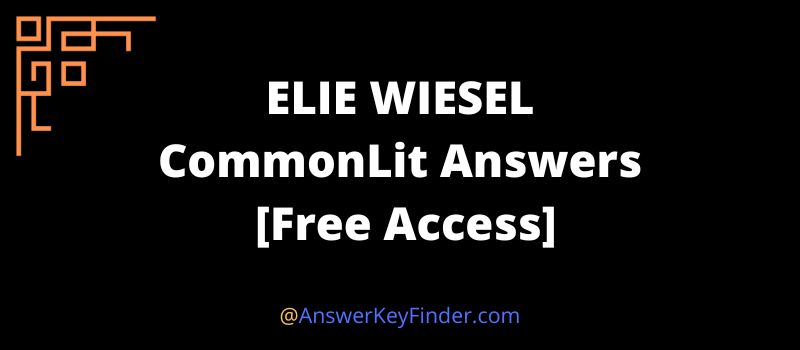In this session, we will reveal ELIE WIESEL CommonLit answers that are absolutely FREE to view.
Before publishing, every answer for Elie Wiesel’s CommonLit article undergoes a thorough review to ensure its accuracy & reliability. If you find them helpful, please don’t hesitate to share.
ELIE WIESEL CommonLit Answers Key – FREE Access
Find the answer key for the topic “ELIE WIESEL” below:
Note: Be prepared to share your original ideas in a class discussion.

Discussion Questions & Answers
Following are our answers based on the questions provided:
Q.1. Given what you have learned about Elie Wiesel, do you think he would consider himself a hero? Why or why not? In the context of this article, what makes a hero? Cite evidence from this text, your own experience, and other literature, art, or history in your answer.
Ans: Elie Wiesel is a survivor of the concentration camps in Germany. In his prologue in Night, he states he doesn’t consider himself a hero. He doesn’t think he’s a hero because he saved many lives. He did what he had to do, not for fame. A hero is someone who saves lives, even if it means endangering your own life.
Hence, I don’t think he would consider himself a hero because he was just trying to survive a horrible experience. I myself believe he was a hero considering that he was trying to help other people.
Q.2. What other figures from history or literature remind you of Elie Wiesel? What shared experiences or characteristics do they have? In the context of this article, what can we learn from tragedy? What did Elie Wiesel try to teach the world from his own tragedies? Cite evidence from this text, your own experience, and other literature, art, or history in your answer.
Ans: One figure that Elie Wiesel reminds me of is Martin Luther King. This is because they both promoted human dignity and stood for what was right. They both have had problems with people of authority, racism, and inequality. Elie taught the world that everyone can stand up and face their trauma. “The Elie Wiesel Award recognizes internationally prominent individuals whose actions have advanced the Museum’s vision of a world where people confront hatred, prevent genocide, 8 and promote human dignity. “
Q.3. This text describes the numerous awards Elie Wiesel was given but does not speak to the full scope of Wiesel’s teaching and writing. Which do you think is more important for success: your work, or your recognition?
Ans: Work is better than recognition because if you have recognition without the work, it will be useless. For example, the author says, “His more than 40 books have won numerous awards, including the Prix Medicis for A Beggar in Jerusalem, the Prix Livre Inter for The Testament, and the Grand Prize for Literature from the City of Paris for The Fifth Son.” Meaning, he won awards because he wrote more than 40 books. This is important because Elie Wiesel works really hard to get recognition. To conclude, you can’t get recognition without doing any work.
Assessment Questions & Answers
Following are our answers based on the questions provided:
Q.1. PART A: Which statement best identifies the central idea of the text?
Ans: Wiesel has been recognized for sharing his experiences in the holocaust as a way to advocate for human rights.
Q.2. PART B: Which of the following quotes best supports the answer to Part A?
Ans: “His personal experience of the Holocaust led him to use his talents as an author, teacher, and storyteller to defend human rights and peace throughout the world.” (Paragraph 2)
Q.3. PART A: What impact does the phrase “deportation by cattle car” in paragraph 4 have on the reader’s understanding of the text?
Ans: It emphasizes the degrading treatment Wiesel and other Holocaust victims faced.
Q.4. PART B: Which quote from paragraph 4 best supports the answer to Part A?
Ans: “stripped of their humanity”
Q.5. How does the conclusion of the article in paragraph 10 contributes to the central idea of the text?
Ans: Elie Wiesel is a Holocaust survivor and Nobel laureate. In this essay, he reflects on the importance of remembrance. He argues that remembering the Holocaust and its victims is important in order to honor their memory and to prevent such a tragedy from happening again. We must also never forget the bystanders who did nothing to stop the atrocities.
You can find answer keys for other grade 9 topics below:
=> EVERYDAY USE
=> CONFORMITY
=> ON TRAGEDY
=> ARACHNE
Note: In case, you have anything to share related to this topic let us know through the comment box below.
Conclusion
In CommonLit, “ELIE WIESEL” is one of the students’ favorite articles authored by The United States Holocaust Memorial Museum for grade 9 students.
In this captivating article, Wiesel shared experiences that have impacted human rights activism.
Hope you got ELIE WIESEL CommonLit Answers Key for free as promised. Share with your batchmates if you find this helpful.
Hi, I’m Annie Smith, and I’ve been a teacher for over 5 years and have taught students at all levels. I love to help students get ahead of their exams and provide helpful guides on various topics.
